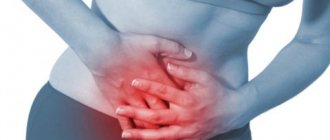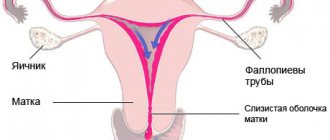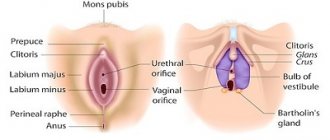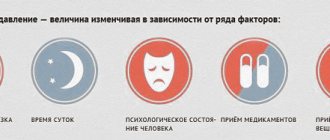Menarche, or the first period in girls, is an indicator of reproductive health and should occur at the time set by nature. The normal age for the onset of the first menstruation is adolescence. Harbingers of menstruation include aching, nagging pain in the lower abdomen and lower back, increased appetite, drowsiness, and irritability.
At what age do the first periods begin?
{banner_banstat0}
Menarche, or first menstrual bleeding, is the central event of puberty. This is a sign that a girl’s reproductive system is ready to reproduce.
Normally, menarche begins between the ages of 12 and 14 years. The formation of the menstrual cycle is influenced by heredity, climatic factors, the girl’s weight, quality of nutrition, the presence or absence of diseases of the endocrine glands, and other health problems.
In rare cases, menstruation begins at age 9. In this case, they talk about early puberty, but this is not a sign of pathology. If menstruation is absent at the age of 15 years and older, then the girl is diagnosed with “primary amenorrhea.” In this case, the teenager needs to be thoroughly examined.
What affects the duration of regulation?
Based on the genetic characteristics of the structure of the genital organs, blood clotting, and hormone secretion, an approximate characteristic of the regula is established, so for women of the same family, the intensity, volume, type and duration of menstruation often coincide.
Age affects the condition of the ovaries, body structure, metabolism, and psycho-emotional health. Due to changes in these criteria, changes in the secretion of substances continue, and the duration of menstruation depends on the work of the hormone-producing glands.
Among the independent factors, the state of women's health is affected by any temperature, climate, or natural changes.
| Factor | Additional pathogen | Consequence |
| CNS dysfunction | Stress, depression, overwork | Excessive secretion of cortisol (stress hormone) |
| Diseases of the female organs | Infections, inflammation, heredity, ovarian dysfunction | Violation of the structure of the mucous membranes of organs, tissue damage (excessive blood loss) |
| Changes in the functioning of the endocrine system | Deviation in the functioning of the endocrine system | Cycle failure |
| Poor nutrition | Overeating, fasting | Hormonal imbalance due to loss of vitamins |
| Ecological situation | Change in climatic conditions | Increase duration for a short time |
The fight against negative factors must begin with lifestyle changes, which play an active role in the formation of a stable cycle.
Proper alternation of work and rest, absence of overexertion, regular maintenance of muscle tone, restrictions on exercise, a nutritious diet and sleep are the first steps towards normalizing regulation.
The first signs of menstruation in girls
You can assume that the first critical days will soon begin a year before menstrual bleeding.
What to pay attention to:
- The figure changes according to the female type. A mother has to buy her child's first bra.
- The reproductive organs enlarge, hair appears on the pubis and in the armpits.
- The sebaceous glands begin to work actively. Acne appears on the face and body, hair becomes oily, and seborrhea may develop.
- Leucorrhoea is a white vaginal discharge that does not cause discomfort. As they mature, they become more viscous and abundant.
- Aching pain without signs of inflammation in the lower abdomen. These symptoms can be observed several months before menarche, or just before the first menstruation.
- Changes in behavior in adolescents, tearfulness, frequent mood swings, aggression. This is the same PMS as an adult woman.
Some anatomical and physiological features of the female body
The external female genitalia (pubis, labia, vestibular bulb, large and small vestibular glands, clitoris) are designed to protect the internal genital organs. The labia minora border the urethral opening and the vestibule of the vagina. The clitoris is the connection point of these organs. It is rich in nerve endings, so its main function is to bring pleasure to a woman. Inside, the vagina is connected to the cervix. Next, the uterus expands, a fertilized egg (zygote) enters it, from which the fetus is subsequently formed. If the egg is not fertilized, it leaves the body along with bloody discharge. Accordingly, the place prepared for implantation of the zygote also becomes unnecessary. 2 weeks after ovulation, the endometrial epithelium is torn off and excreted in the form of bloody discharge. After this, the cycle repeats again.
What are girls' first periods like?
{banner_banstat1}
There are no strict criteria for the color, consistency, or appearance of the first menstrual flow. Everything is individual and depends on heredity, hormonal levels, and even on the girl’s awareness of this event in life.
How many days are there?
The normal duration of menstruation is from 3 to 7 days. And menarche is no exception. If menstruation lasts more than 10 days, then the girl needs to be shown to a gynecologist.
The normal duration of the menstrual cycle is 21–35 days. In 30% of cases, girls will have their second period within the time frame established by nature. For the rest, the cycle should form within a year.
What does your first period look like?
{banner_banstat2}
It can be thick brown discharge, scanty spotting, full bleeding similar to adult women - you can see in the photo.
The standard situation in adolescence - menarche - begins with slight brown discharge. Bleeding occurs on days 2–3, then the amount of blood decreases. On days 5–6, spotting or clear bloody discharge may be present.
How long do critical days last (how many days does a period last normally)?
Normally, the duration of the menstrual cycle (the period of time from the beginning of the previous menstruation to the beginning of the next) ranges from 21 to 35 days1,2. The menstruation itself lasts approximately 2–8 days1 (this is the period of bleeding from the vagina). During normal periods, 50–80 milliliters of menstrual fluid are released1. Some women may experience mild lower abdominal pain before and during menstruation.
Up to contents
What to do when your period starts?
The mother should prepare the girl for this event several months, and ideally several years before the onset of menarche. But even a theoretically prepared child, seeing blood-stained underwear, can be scared.
What should all family members do:
- To mom.
I must calm the girl down, congratulate her, and give her hygiene products. Remind your daughter to change the pad after 3-4 hours, regardless of how full it is. - To the girl
. It is necessary to inform the mother about the upcoming event. Observe hygiene requirements and do not perform labor or sports feats. - Dad
, other family members. Congratulate the child, buy a cake. Do not give lectures about the need to be modest and not communicate with boys, do not scare them with a possible pregnancy.
Cycle phases
How many days does the menstrual cycle (MC) last? This question interests many. The duration of this process under ideal conditions should be 28 days. Theoretically, the female body is ready for pregnancy every month. Girls whose MC is more than 28 days but less than 36 days should not worry, since all these are normal variants. A long cycle between periods is most likely an indicator of a long first half of the cycle, that is, the follicular phase. Under such conditions, the oocyte simply needs more time to mature. Any changes in the rhythms of the cycles should be a reason to consult a doctor.
Phases of the menstrual cycle:
- Stage I (menstrual). One of the most painful, since at this time menstrual flow and epithelial rejection are observed. The first days are the most painful period in the cycle. On average, the first phase of the menstrual cycle ranges from 3-6 days. The first day of menstruation is considered to be the beginning of MC.
- Stage II (follicular). The content of pituitary hormones in the blood increases. The main one is FSH (follicle-stimulating hormone), it stimulates the ovaries to produce eggs (female reproductive cells). Follicles are sacs in the ovaries that are filled with fluid. Each follicle contains an immature egg. FSH activates the maturation of a certain number of follicles. The ovaries produce female steroid hormones (estrogens), which prepare the endometrium for implantation of a fertilized cell. The second phase of the cycle lasts 14 days.
- Stage III (ovulatory). The duration of the phase is about three days. The mature egg leaves the follicle and then moves through the fallopian tubes to the uterus. By the time of puberty, girls have up to half a million eggs in their ovaries. Their laying occurs during the embryonic period. The process of an egg leaving the follicle is called ovulation. How many eggs mature in one cycle? About 20 gametes normally mature in the ovary every month. When a follicle ruptures, one, or less often 2-3, eggs emerge from its cavity. Very often, ovulation in girls is accompanied by severe pain. Most often it hurts in the lower abdomen.
- Stage IV (luteal). The duration of the phase varies in the range of 10-16 days. At this time, many hormones (progesterone and estrogen) are synthesized, preparing the entire body for bearing a child.
Hygiene products
{banner_banstat3}
The first hygiene products should be prepared by the mother of a teenage girl at the first signs of the end of puberty. That is, if the daughter is 11–12 years old, then a package of pads should be in the teenager’s closet.
Tampons should not be used at this age. The girl has no experience of behavior during menstruation or the skills of inserting a tampon. Due to inexperience, she may forget about this hygiene product in the vagina, which is fraught with the development of an inflammatory process.
When choosing gaskets, consider:
- Age
. You should not buy hygiene products designed for heavy discharge. For the first cycle, pads marked “Normal” or 2 drops are enough. Additionally, purchase a kit for use at night. Such pads are longer than regular ones and the risk of staining the bed linen is minimal. - Quality
. The girl should be comfortable. This must be a manufacturer tested by my mother. It is best to use ultra-fine products. They do not restrict movement and are invisible under clothing.
Before menstruation, the mother should check with her daughter about the availability of hygiene products. Despite the outward appearance of maturity or swagger, the teenager will be embarrassed to purchase pads for a long time.
ob® tampons for the first period
Girls can use ob® tampons from their first period. Such hygiene products will help you feel comfortable and confident. With them, you can not give up your favorite activities (for example, dancing or swimming) during your period. Do not be afraid that a tampon can damage the hymen. During menstruation, it becomes elastic and stretchable, in addition, it has a hole for the outflow of secretions. For girls, small tampons are optimal - ob® ProComfort® Mini or Normal. When filled, they increase by only 10–15% of their original value. And thanks to the silky SilkTouch™ coating, hygiene products are especially easy to insert and remove. You may be worried that your tampon might get lost inside your body. But this is not true: you can always remove it by simply pulling the durable pull cord. When used correctly, tampons do not harm your health. Just read the instructions carefully before using them or consult a gynecologist.
Literature:
- Nikitina I.L. The start of puberty – the well-known and new Federal State Budgetary Institution “Federal Center for Heart, Blood and Endocrinology named after. V.A. Almazova" Ministry of Health of the Russian Federation, St. Petersburg, Russia Arterial hypertension. 2013; 19(3): 228-236 https://cyberleninka.ru/article/n/start-pubertata-izvestnoe-i-novoe/viewer
- Gritsinskaya V.L., Mamedova S.M., Nikitina I.L. Indicators of physical and sexual development of girls of puberty age in St. Petersburg Federal State Budgetary Institution National Medical Research Center named after. V.A. Almazova" Ministry of Health of Russia, St. Petersburg Reproductive health of children and adolescents. 2017; 6: 22-29 https://cyberleninka.ru/article/n/pokazateli-fizicheskogo-i-polovogo-razvitiya-devochek-pubertatnogo-vozrasta-v-sankt-peterburge/viewer
- Lisitsyna O.I., Khilkevich E.G. Premenstrual syndrome. New therapeutic possibilities National Medical Research Center for Obstetrics, Gynecology and Perinatology named after Acad. V.I. Kulakova Ministry of Health of Russia, Moscow Medical Council. 2017; 13: 50-53 https://cyberleninka.ru/article/n/predmenstrualnyy-sindrom-novye-vozmozhnosti-terapii/viewer
Hygiene rules
{banner_banstat4}
There are no specialized recommendations for self-care during this period. The girl should already be able to wash herself and do it 2 times a day - morning and evening. You should not use antibacterial soap or gel unless absolutely necessary. Clean running water is sufficient.
If your daughter is uncomfortable, then she can carry out water procedures during menstruation at a time convenient for her.
Mom should remind her to wash her hands before and after changing the pad. Hygiene products should be changed every 3-4 hours, regardless of how full they are. Important! Entering adulthood is a joyful and anxious moment for any girl. Late or early menarche is a reason to consult a doctor. It is important that everything corresponds to physiological standards.
Lecture “How to avoid becoming a victim of a gynecologist”
Introduction
It just so happens that the reproductive function is activated in the girl’s body at the moment when she does not care about this function at all.
Having just put the dolls aside, the girl is faced with a whole series of little-understood processes occurring in her body, which immediately begin to be heatedly discussed among her peers, with consultations from those who are older. And mothers in this situation do not always rise to the occasion, since they themselves are poorly versed in this topic. So, let’s figure out once and for all what happens to you every month, dear women, what is considered normal, what should alert you.
Most women, when asked about the duration of their menstrual cycle, answer with a similar phrase “about once a month, a couple of days earlier than in the previous month”
- this intricate phrase denotes the duration of the cycle of 28 days. This cycle length occurs in most healthy women, but does this mean that a shorter or longer cycle is a manifestation of pathology? No!
It is recognized that a normal menstrual cycle can last from 21 to 35 days
, that is, plus or minus a week from the average of 28 days. The duration of menstruation itself can normally range from 2 to 6 days, and the volume of blood lost should be no more than 80 ml. A longer cycle occurs among residents of the northern regions, a shorter cycle among those living in the southern regions, but this is not an absolute pattern.
Regularity is important in the menstrual cycle.
That is, if a woman’s cycle is always 35-36 days, then this can be absolutely normal for her, but if it is either 26, then 35, then 21, this is not the norm.
Thus, a pathology can be considered irregularity
(when menstruation comes at an unequal period of time),
a long cycle
(more than 36 days) or
a short cycle
(less than 21 days). In general, the menstrual cycle can vary greatly depending on the condition of the woman and the situation in which she finds herself.
However, the lability of the menstrual cycle varies among different women depending on external and internal factors. For some, a little stress can already lead to a delay in menstruation, while for others, severe depression is not a reason for menstrual irregularities. The menstrual cycle of one woman can adapt to the menstrual cycle of another if they live together for a long time. This is often seen on women's sports teams or when living together in a dorm. It is not entirely clear what explains this fact. All we can say is that the menstrual cycle
Although it is a clear mechanism,
it can change significantly in a normal healthy woman
, and these changes are a reflection of the body’s reaction to external and internal factors.
The menstrual cycle is not always stable
The most irregular period is the first two years after the start of menstruation and three years before its end (menopause). Violations during these periods are due to completely physiological reasons, which we will discuss below.
Where do these numbers come from and why might they change?
The menstrual cycle is divided into three phases:
menstruation, the first phase (follicular) and the second phase (luteal). Menstruation lasts on average 4 days. During this phase, the lining of the uterus (endometrium) is shed due to failure to become pregnant.
First phase
lasts from the end of menstruation until ovulation, that is, on average until the 14th day of the cycle with a 28-day cycle (the days of the cycle are counted from the moment the menstruation begins).
This phase is characterized by the following events:
several follicles begin to grow in the ovaries (from birth, the ovaries contain a lot of small vesicles (follicles) containing eggs). During their growth, these follicles secrete estrogens (female sexual hormones) into the blood, under the influence of which the mucous membrane (endometrium) grows in the uterus.
Shortly before the 14th day of the cycle, all follicles except one stop growing and regress, and one grows to an average of 20 mm and bursts under the influence of special stimuli. This process is called ovulation. An egg emerges from the ruptured follicle and enters the fallopian tube, where it awaits the sperm. The edges of the ruptured follicle gather (like a flower closing for the night) and this formation is now called the “corpus luteum.”
Immediately after ovulation, the second phase of the cycle begins.
It lasts from the moment of ovulation until the start of menstruation, that is, about 12-14 days. During this phase, the woman's body waits for the pregnancy to begin. In the ovary, the “corpus luteum” begins to flourish - the corpus luteum formed from the burst follicle sprouts vessels and begins to secrete another female sexual hormone (progesterone) into the blood, which prepares the uterine mucosa for the attachment of a fertilized egg and the beginning of pregnancy. If pregnancy does not occur, then a signal is sent to the corpus luteum and it curtails its work.
When the corpus luteum stops secreting progesterone, a signal is sent to the uterus, and it begins to reject the no longer needed endometrium. Menstruation begins.
With different cycle lengths, the duration of the phases is reduced - this means that one woman needs 10 days for the follicle to mature, while another needs 15-16.
Having understood what the menstrual cycle consists of, it is easy to understand what determines its duration normally and in the presence of pathology.
Why is everything often unstable at the very beginning and then, after childbirth, it gets better?
A woman's reproductive system matures gradually and, being a complex mechanism, requires a period of adjustment.
The fact that a girl has her first menstruation
does not mean that her system is mature and ready to work fully
(although for some, the menstrual cycle begins to work correctly from the very beginning).
The functioning of the female reproductive system can best be compared to an orchestra, the coordinated play of all the instruments of which creates the unique sound of a piece of music - in our case, the regular menstrual cycle.
Just as instruments in an orchestra require a period of tuning, all components of the reproductive system need to agree with each other to understand and work together harmoniously. Such a rehearsal usually takes about 6 months - for some it is longer, for others it is shorter, and for others it may take longer.
Why do there be delays or do my periods start earlier?
Everything is very simple - if during the first phase of the cycle it is not possible to grow a full-fledged follicle, which could burst in the middle of the cycle (ovulation), then the second phase of the cycle, accordingly, does not begin (no ovulation - there is nothing to form the corpus luteum from). The first phase lasts a long time, until the uterine mucosa (endometrium), which has grown under the influence of estrogen, begins to be rejected on its own (like a pyramid of cubes collapses when it is stood too high). The cycle in this situation can last up to several months.
In this case, in the next cycle, ovulation may occur and the cycle will have a normal length. When such alternation occurs, they speak of an irregular menstrual cycle.
Another reason for delayed menstruation may be the existence of the corpus luteum for too long.
As I noted above, it lives for about 10 days and then begins to curtail its work, since pregnancy has not occurred. But sometimes it happens that despite the fact that pregnancy has not occurred, the corpus luteum continues its work and menstruation does not occur, and occurs only when the corpus luteum finally decides to leave.
Earlier onset of menstruation
This is usually due to the fact that the notorious corpus luteum, on the contrary, stops its work too early. This leads to an earlier onset of menstruation.
Remember how the orchestra sounds when it tunes its instruments - the same cacophony from the menstrual cycle is often observed at the beginning. The components of the reproductive system negotiate so that they can grow a follicle in 14 days, start the ovulation process, and maintain the corpus luteum for at least 10 days. At the beginning, she does not succeed in all stages of this work and this is manifested by an irregular menstrual cycle.
But this adjustment can be seriously interfered with by the person himself. Nothing has such a negative effect on the development of the reproductive system as stress.
(intense study, exams, unhappy love),
intense sports training, extreme weight loss, frequent illnesses, smoking, alcohol and drugs.
Against the backdrop of all of the above, quite often
menstruation disappears
and then you have to wait a long time for them. And the reason is very simple, I would say there is simple biological expediency in this - in extreme living conditions and when, for health reasons, a woman cannot bear healthy offspring - the reproductive function is switched off until better times. It’s not for nothing that during the war, most women stopped menstruating; this phenomenon was even given a special term “wartime amenorrhea.”
What to do about it?
Let me make a reservation right away that I am not taking into account various diseases, I am talking about some common problems with adjusting the menstrual cycle. Such cycle disorders are solved by taking hormonal contraception. Here we need to return again to the comparison with the orchestra. If the orchestra starts to go out of tune, you must stop playing completely, give the musicians a rest and start again. Hormonal contraception does just that. She turns off the reproductive system and “rests” the entire time she takes contraception. Then, after its cancellation, the system begins to work again and, as a rule, the cycle failures disappear.
Why does the cycle quite often become stable after childbirth, and sexuality flourishes?
The orchestra can rehearse as much as it wants, but it is finally played only when it performs its first concert from beginning to end. Pregnancy is the only purpose for which the reproductive system is designed in the body.
Only after the first full pregnancy, which ends in childbirth and the period of breastfeeding, the reproductive system matures completely, since during this period all the functions provided by nature are realized. After pregnancy, a woman finally matures and all the not fully “unpacked” properties of the body finally begin to work in full force.
The reproductive system must be used for its intended purpose - this is important; menstruation is not a function of the reproductive system, but a monthly reminder that it exists at all and is still working.
Let's step beyond 30...
Time passes, the reproductive system, which on average is allotted to exist in working order for 38 years (from 13 to 51), instead of performing its function is limited only to regular menstruation.
For reference:
on average, a woman experiences about 400 menstruation during her life (with 2 births) and loses about 32 liters of blood, while during reproductive behavior (pregnancy, childbirth, 3 years of breastfeeding, and only then 1-2 menstruation and pregnancy again ) there are about 40 menstruation periods.
In addition, as a woman ages, her history of various gynecological and general diseases
, and all this begins to affect the state of the reproductive system and, therefore, is reflected in menstrual irregularities.
Inflammation, abortion, gynecological operations, overweight or underweight, and common chronic diseases can cause problems.
Menstrual irregularities in the form of delays or earlier onset of menstruation a couple of times a year can occur even in the absence of any pathology.
As a rule, this is due to climate change or other stresses on the body (illness, hard work, personal problems, etc.). All nervous professions can lead to either delays in menstruation, their earlier onset or complete cessation.
Every woman is different, so everyone's cycle will change differently depending on the type of stress response and the phase of the cycle in which it occurs. For the majority of women, nerve work does not affect their menstrual cycle at all. Cycle disorders
, especially if it was stable before, often make a woman think that something is wrong with her.
Not in all cases you need to panic.
If you can clearly remember any negative events in the recent past that greatly shocked you, then most likely this is a one-time cycle disruption and there is nothing wrong with it. If there is no menstruation for a very long time (and the pregnancy test is negative), then you need to consult a doctor. If menstruation came earlier and does not end, this is also a reason to rush to see a gynecologist.
Sometimes cycle disorders can manifest as very frequent menstruation
(several times a month).
And there is no need to delay it - see a doctor immediately. But if the regularity of the cycle disappears completely
, this is also a reason to consult a doctor.
Regularity
– the main indicator of the normal functioning of the reproductive system. Sometimes it happens that a cycle had one duration and suddenly becomes shorter while maintaining its regularity. As a rule, this is due to the fact that the second phase of the cycle becomes shorter, as the corpus luteum begins to work less. Such changes are more often observed closer to 40 years. This is not a reason to panic, but simply a reflection that your reproductive system will change as you age, just like you.
Early menopause
This is one of the very common fears of women. In fact, this fear is exaggerated, since early menopause is quite rare
. It is mainly caused by rare congenital diseases, rare systemic diseases, consequences of treatment (chemotherapy, radiation therapy for cancer) and other rare conditions. There are situations when, as a result of surgery, a woman’s ovary or part of it is removed. Then menopause may occur earlier due to the fact that there is little tissue left in the ovaries that could support the normal functioning of the reproductive system.
Early menopause
As a rule, it is manifested by the cessation of menstruation and the appearance of symptoms of insufficiency of female sex hormones (hot flashes, irritability, tearfulness, insomnia, etc.). There is no prevention of this disease.
Painful periods and PMS
For some reason, it is generally accepted that feeling unwell during menstruation is normal.
The presence of pain, nausea, and migraines during menstruation
is not normal.
This condition of painful menstruation is called
dysmenorrhea
and requires treatment. Even if these phenomena are expressed insignificantly, they can and should be corrected.
Dysmenorrhea
It can be either
primary
(most often at a young age), when it is most likely due to simply the immaturity of the reproductive system, and
secondary
– when it is a reflection of a number of serious
gynecological diseases
.
The same applies to premenstrual syndrome. In general, the widespread popularization of this syndrome allows women to attribute their sometimes not entirely adequate actions and behavior to manifestations of this syndrome. However, PMS is not a woman’s personality trait.
, which everyone has to put up with.
PMS is a disease
that has incompletely understood causes, a whole list of symptoms and specific treatment measures. Manifestations of PMS can and should be corrected. It is wrong to take monthly illness for granted in modern conditions. If you have such problems, consult a doctor.
How it all ends
Decline of the reproductive system
usually occurs in the same way as its formation. Menstruation becomes irregular and there is a tendency to be delayed. This is due to the same reasons as in the beginning.
The ovaries respond less well to stimuli from the brain. It is not possible to grow follicles that could reach ovulation - accordingly, the cycle is delayed. If ovulation occurs periodically, the resulting corpus luteum does not work well. Because of this, periods either start earlier or, on the contrary, are delayed for a long time. Eventually your periods will stop, and if you haven't had them for more than 6 months, you should see a doctor. Based on hormonal tests and ultrasound, the onset of menopause can be assumed.
Sometimes there are cases when menstruation stops for a long period of time
, and according to tests and ultrasound, the onset of menopause is expected. This can be especially frightening for young women. However, this may only be a temporary period, and menstruation may resume on its own, for example after proper rest.
Thus, the myth that 28 days is the norm and everything that differs from this figure is pathology has been debunked. The main thing in the menstrual cycle is its regularity, and the duration of the cycle can fluctuate over a wide range.
And yet, there is a simple rule: if you regularly undergo preventive examinations with a gynecologist (at least once a year), if any violations appear, do not put off an “unpleasant” trip to the gynecologist - then you will almost never have serious gynecological problems.
Video version:
Why does dysmenorrhea occur?
This can only be determined by a specialist - a gynecologist. In most cases, the cause is increased excitability, neuropsychic instability at the beginning of menstruation. Pain can also be caused by anatomical changes in the genital organs. For example, if the uterus is small during menstruation, it can compress the nerve endings, causing discomfort. Sometimes the cause of pain can be mechanical obstacles to the free flow of blood, which happens in adolescence when the uterus is underdeveloped. Treatment of girls suffering from primary dysmenorrhea is not the easiest task, since its cause is not so easy to find, and if it is known, it cannot always be eliminated. Pain is often caused by a number of factors, among which almost always is psychogenic. Therefore, when prescribing any treatment, the neuropsychic state of the patient should be taken into account, without normalization of which local treatment is useless. Patients suffering from genital hyperplasia and constitutional abnormalities are difficult to treat. It is important to eat well, normalize living conditions, and use restorative medications. Primary dysmenorrhea is also treated with hormonal drugs. But here you cannot do without symptomatic treatment - the use of painkillers. Very rarely, but with excruciating pain one has to resort to anesthesia and novocaine blockade. There is an opinion that painful periods go away after a girl gets married, when regular sex life begins, pregnancy and childbirth occur. But, it should be borne in mind that marriage and sexual activity before the age of 18-20 are unacceptable and even in some cases harmful to the female body. In addition, only a doctor can decide what type of pain during menstruation in a particular case. Therefore, you cannot do without visiting a specialist.
Treatment for menopause
Therapy is necessary in case of a serious threat to health and is prescribed individually.
Its goal is to reduce symptoms, reduce the risk of developing chronic diseases and improve quality of life. The most effective treatment for menopause is considered to be taking medications containing estrogen. This replacement therapy eliminates hormone deficiency in the blood.
Other drug treatments include:
- antidepressants and sedatives to reduce the frequency and severity of hot flashes;
- antihypertensive drugs for hypertension (high blood pressure);
- drugs that increase bone density;
- vaginal medications to reduce vaginal dryness.
In case of psycho-emotional disorders, it is recommended to seek help from a specialist.
Author:
Pugonina Tatyana Alekseevna, Therapist
In what cases should you consult a doctor?
- if your period unexpectedly disappears for more than 90 days
- if the cycle was regular, and suddenly stopped being so
- last longer than 7 days
- you have to change pads or tampons more often than once every 1-2 hours
Important! One of the most common reasons for missed periods in teenagers is pregnancy.
If you're unsure whether you want to have sex with a guy for the first time, it's best to put it off until you feel more confident in your decision.
Remember that even if you have sex for the first time, you can get pregnant or get an STD from your partner.
Even just one unprotected sex can have serious consequences for your health and well-being.
Take care of your health and refuse to have unprotected sex.
If your partner puts pressure on you, demands to have sex, or refuses to use contraception, you need to seriously think about how strong and respectful your relationship is. The rules of sex should be mutual and not bring unjustified risks into your life. Take care of your emotional and physical health.











